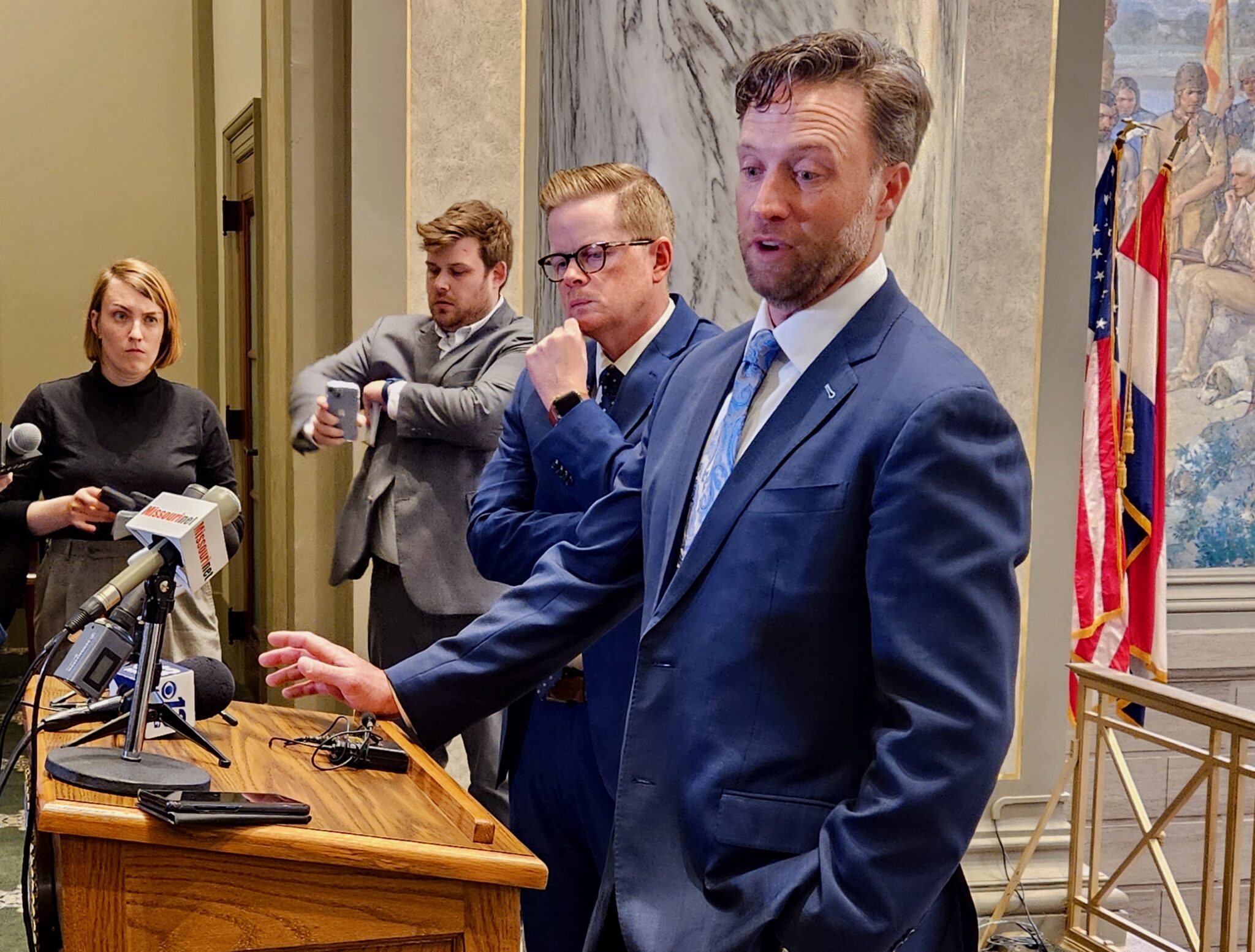Missouri lawmakers approve largest budget in state history — almost $51 billion

With just about an hour to spare before the constitutional deadline, Missouri lawmakers on Friday approved a record state budget of almost $51 billion that increases pay for highway patrol troopers and direct care workers and one of the biggest boosts in years for higher education.
The $50.7 billion spending plan headed to Gov. Mike Parson’s desk is $1.3 billion more than he proposed in January and $2.2 billion more than the House-approved budget. It exceeds the budget approved in last year’s session by $1.7 billion.
A large portion of the difference is adoption of the Senate plan for widening Interstate 70. Parson initially proposed spending $859 million to add lanes to a 55-mile stretch of the east-west interstate highway, a proposal the House supported but that the Senate increased to $2.8 billion.
At a news conference after the Senate votes, Appropriations Committee Chairman Lincoln Hough said Missourians should see work on the project begin later this year.
“I imagine there’s going to be a pretty expedited effort on MoDOT and the (Office of Administration)… to start working together and getting that moving,” Hough said.
There is also money to build a $300 million psychiatric hospital in Kansas City to replace the aging Center for Behavioral Medicine, funding for construction projects on every college campus and new projects like a $45 million health education building at St. Louis Community College and dozens of smaller projects in communities around the state.
The big-ticket spending items are possible because of the massive state surplus accumulated in the general revenue fund and other accounts in the treasury. At the end of April, there was $5.4 billion in the general revenue fund, 16 times more than the same date five years ago.
General revenue growth rates dipped below 10% in April for the first time since late 2020. Since the start of the month, revenue growth has been strong and the surplus, projected in January to be $5 billion on June 30, could exceed that amount by as much as $1.2 billion if growth remains strong.
The biggest unanswered question when the day began was whether the Senate had solved the issues that generated a nine-hour filibuster on Thursday. Until that filibuster ended, begun over demands from Sen. Rick Brattin that the Senate pass a bill intended to stop a landfill in southern Kansas City, it was holding up procedural steps necessary for easy passage of spending bills.
A deal that ended the filibuster required the Senate to debate a bill giving some new small businesses a break from many regulations, providing tax credits for rural investment and cutting personal property taxes. It also meant the Senate approved two bills extending Medicaid coverage for pregnant women to a year after they give birth.
It also meant some additional items in the budget – $100,000 for an environmental study of the area with the proposed landfill – as well as unrelated demands for two projects in St. Charles County, $5 million to provide drinking water upgrades in St. Charles and $7 million an updated emergency communications system.
Hough said he received numerous calls from agencies in St. Charles asking for the money and he agreed despite the participation of Sen. Bill Eigel, R-Weldon Spring, in the filibuster.
“One thing that you saw in this budget, I mean, there’s, there’s ways to be punitive to people, and we didn’t do that,” Hough said.
Once the Senate turned to the 17 spending bills – 13 for operations in the coming fiscal year, four for construction and maintenance spending and one to pay the state’s bills this year – the votes came quickly. There was little discussion, with each bill taking only enough time for Senate Appropriations Committee Chairman Lincoln Hough, R-Springfield, to give the highlights.
Some of the highlights of the budget going to Parson include:
- $233 million to fully fund public school transportation for the second consecutive year, $56 million to expand pre-kindergarten programs and $78 million to increase child care subsidy payments.
- Funding boosts to higher education that include a 7% increase in institutional funding, plus projects that include a new veterinary hospital and a research slaughterhouse at the University of Missouri.
- $25 million for the Department of Transportation to do environmental studies on Interstate 44 and U.S. 63 and $50 million to improve safety at railroad crossings along with the $2.8 billion for I-70.
- $30 million to support the fund paying for operations at veterans nursing homes. The homes were funded in the past from casino boarding fees, but far fewer people are visiting gambling boats than in the past.
- $250 million to boost pay for direct care aides and $32 million to increase funding for area agencies on aging.
- $50 million for improvements at Arrowhead Stadium in advance of the 2026 FIFA World Cup.
Passage went smoothly in the House, where there were fewer than 10 dissenting votes on bills making up the operating and capital spending budgets. During the brief debate on the operating budget – 13 bills – Democrats said they were generally pleased with extra funding added in the Senate and that it had broad acceptance among Republicans.
State Rep. Kevin Windham, D-Hillsdale, was one of the few to oppose the higher education bill, which boosts state aid to colleges and universities by 7% and includes an extra 2% boost through a yet-to-be-completed performance funding system.
Windham said he objects to language in the budget that denies state-sponsored scholarships and in-state tuition rates to students who have an undocumented immigration status. He was pleased the anti-DEI language was taken out, he said.
“I am going to vote against the underlying bill because although the conference committee report strips off some hateful language, it keeps some hateful language in it, and that is language that says undocumented students cannot receive scholarships or attend for in-state tuition,” Windham said.
And Rep. Deb Lavender, D-Manchester, decried what she said was inattention to the needs of people with disabilities. Lawmakers approved an 8.7% pay raise for state workers this year, and gave employees of the Missouri State Highway Patrol another 11.3% boost in the budget passed Friday.
The budget gives only a 4% raise to direct care workers, who currently have a base rate of about $15 an hour. The justification for patrol raises, she said, is that they are underpaid and higher wages are needed to attract new troopers. And the House passed a big tax cut bill this week as well, she noted.
“As much as you tell me we can’t afford this ongoing cost, you had no trouble passing a $2.3 billion tax cut the other day on this floor,” Lavender said. “Let’s hope they’re still with us next year.”
The budget going to Parson restored funding for public libraries cut in the House and removed language barring diversity, equity and inclusion programs in state agencies or among state contractors.
Both items would have disrupted smooth consideration of the budget in the Senate.
“I’m relieved that they weren’t insane,” Rizzo said of the Republican efforts to fight culture wars in the budget. “When the bar is set so far to the right, when you meet just to the left of that, you haven’t won a victory.”
Miss Clipping Out Stories to Save for Later?
Click the Purchase Story button below to order a print of this story. We will print it for you on matte photo paper to keep forever.

